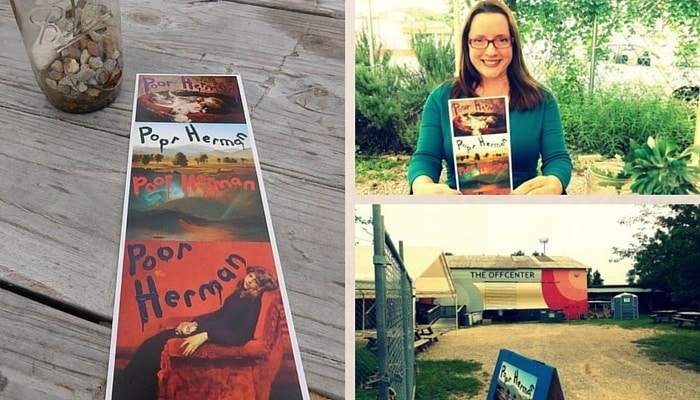
“Poor Herman” is playing at The Off Center through May 28, 2016
Playwright Elizabeth Doss is comfortable in her petite frame and porcelain skin. She doesn’t hide behind caked-on cosmetics, jewels that sparkle or threads that scream “look at me.” The day we met over coffee, her solid cable-knit gray dress accentuated smoky blue eyes framed by shoulder-length blond locks and bangs, held back by a tiny green barrette.
As she began to speak about her upcoming play “Poor Herman,” her eyes began to shift quickly as one thought moved to the next, her hands expressively cutting through the air. It was obvious by her animation that this play is special–and close to her heart.
Theatrical Bloodline
The subject of her play is world-renowned writer Herman Melville. Many know him as the author of “Moby Dick,” but Doss’ knowledge goes beyond the bookshelf. As his great-great-great granddaughter, she shares his blood.
In Doss’ words, “Poor Herman” is meant “to speculate on the line between utter genius and epic failure in us all.” This theme resonates with anyone who has struggled with failure, questioned their worth or been perplexed, confused and curious about their lineage. The theatrical production offers salvation and hope in the turbulent waters that accompany the heavy burden of self-doubt.
The White Whale in the Room
Herman Melville died a financially impoverished man with no fanfare or recognition. His insignificance to the era in which he lived can be read in the clear black ink of his obituary. His name is misspelled.
Early in the first act of “Poor Herman,” the all-female cast informs us that poetic license will be taken. But whatever those liberties may be, it’s obvious the self-centered Melville is not a sympathetic character. The rotation of the all-female cast through male and female roles could have proved confusing, but at no point do audience members lose track of the characters, a testament to the talent on stage.
As the calico fur beard prop gets passed around, the actors enjoy making the most of their opportunity to channel the grumpy protagonist, along with the female siblings who made countless sacrifices to support Melville throughout his pursuit of becoming a well-respected author.
One Man’s Failure Is Another’s Success
While the first act is played straight, the second act is a delightful retelling of Melville’s life story through the narrative of his last–and universally panned–novel “Pierre or the Ambiguities.” The book was considered a literary failure, “the nail on his coffin.”
The short distance between genius and deranged, and the evolution of quality over time have been examined before. But Doss introduces a fresh angle in the third act when she inserts a surprise twist. Given she’s the ancestor of her subject, it’s in these final moments of the play one realizes how personal, even intimate, the study and pursuit of Melville has been to Doss. More importantly, the women in his life whom history pages have mostly discarded are given recognition that is long overdue.
Paper Chairs Gives Life to “Poor Herman”
Join us for Poor Herman…Thursdays, Fridays and Saturdays through May 28th. For more info and tickets visit… https://t.co/mLXucs3chQ
— Paper Chairs (@paper_chairs) May 17, 2016
Paper Chairs brings magic to Doss’ well-written script. This production company was co-founded in 2010 by Doss. I’ve attended performances in diverse and memorable settings, from fiesta-lit backyards to metal-roofed warehouses.
Austin Creative Alliance sums up Paper Chairs nicely, “We favor tour-de-force fusions of various performance styles, music genres and historical periods to excite modern sensibilities and educate by irreverently suggesting past and present cultural connections. The work is outrageous, well-researched, and a little bit dangerous.”
After seeing “Poor Herman,” you’re certain to leave with a new-found wisdom and, oddly, a pocket full of optimism. Not unlike the title of this play, history is rich with irony.
Poor Herman is playing at The Off Center until May 28, 2016 on Thursdays, Fridays and Saturdays. More details here.
@JudyMerhar wants to know:
Have you seen “Poor Herman” yet? If so, what did you think?
- Great Granddaughter Shows New Side of Melville in Theatre Production - May 19, 2016
- Nutritional Wisdom: My Path to Health Enlightenment - March 29, 2016
- ArtisTree Creates Custom Treehouses for Young at Heart - March 2, 2016

Leave a Reply
You must be logged in to post a comment.